This Blue Underground repackaging of their earlier NTSC 'two-fer' release offers one great movie and one not so great, but with the two at the same price as buying either one separately, it's worth picking them both up.
Grand Slam is a surprisingly enjoyable caper flick, and much more fun than any film with middle-aged men in tight black trousers and Klaus Kinski in a sailor suit has any right to be. I say surprisingly because anything that turns up on the Blue Underground label generally turns out to be a disappointment, but this globe-trotting diversion about a heist in Rio de Janeiro during the carnival looks great and is a much better piece of disposable entertainment than either the Rat Pack or Soderberg's Oceanic efforts. Ennio Morricone's main title is a particularly blatant ripoff of Burt Bacharach and the Tijuana Brass' Casino Royale with il maestro's own special flavoring, but only adds to the fun. Although the only extras are a photo gallery and trailer, the 2.35:1 transfer is for the most part very good, with excellent vivid color.
Revolver aka Blood in the Streets aka In the Name of Love is a disappointingly bland and overlong Sergio Sollima cop thriller with a miscast Oliver Reed complete with bad American accent (despite playing an Italian prison warden!) and Fabio Testi only marginally less wooden and ineffectual than usual caught up in a political assassination and kidnapping. Nothing out of the ordinary with some absurd plotting (a politician faced with death threats walking casually through the Place Vendome just so he can get killed, a ludicrous jailbreak from a prison with only rotten wood over the shower windows), the last reel is fairly good when the politics briefly kicks in and the movie refuses to go for the soft and easy ending, but it's outstayed its welcome by then.
A better extras package, with a featurette with Testi and Sollima plus trailer and stills gallery, although the 1.85:1 transfer is grainy in places.
One good, one not
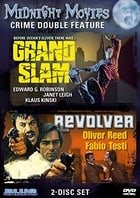 Posted : 12 years, 4 months ago on 6 February 2013 01:57
(A review of Midnight Movies 7: Crime [Region 1] [US Import] [NTSC])
Posted : 12 years, 4 months ago on 6 February 2013 01:57
(A review of Midnight Movies 7: Crime [Region 1] [US Import] [NTSC]) 0 comments, Reply to this entry
0 comments, Reply to this entry
Sex, violence, corruption and Patricia Hayes!
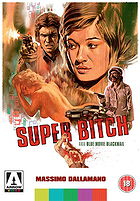 Posted : 12 years, 4 months ago on 6 February 2013 01:54
(A review of Super Bitch )
Posted : 12 years, 4 months ago on 6 February 2013 01:54
(A review of Super Bitch )Is it a bird? Is it a plane? No, it's Super Bitch. Not a superhero film but a prime slice of 70s Italian poliziotteschi that also goes under the titles Blue Movie Blackmail and Mafia Junction, though none are as way out as the typically marque-filling Italian original "Si Può Essere Più Bastardi dell'Ispettore Cliff?," or "It May Be More Bastards, Eh Inspector Cliff?" It covers all the genre conventions: nudity, shootouts, a car chase, a vicious beating, cold blooded murder, corruption and double-crosses left, right and centre, with Ivan Rassimov doing his best Clint Eastwood impersonation (as is the voice artist who dubs him on the English track) as the corrupt undercover cop who's even dirtier than Harry. He's working as an enforcer for a gang of drug runners operating an escort agency in London who film their more prominent clients on the job and blackmail them into using their influence to get their drugs past customs. Naturally, he doesn't bother much with any of the rules. He'll happily sleep with the agency's star performer Stephanie Beacham, kill rivals en masse and possibly even his own suspicious superiors if need be and is lining up a neat pension plan for himself that depends on getting everybody else to kill each other and leave no witnesses.
There's some wonderfully eclectic casting here. Where else could you see the headmaster from Grange Hill as a narcotics agent, Felix Leiter from Goldfinger doing a bunny impersonation with a prostitute, Blake from Blake's Seven as a plainclothes cop, Stanley Kubrick's assistant and former Fenn Street Gang member Leon Vitali as a gay blackmailing escort who gets beaten up while Tutte Lemkow joyfully plays the guitar or, best of all, Patricia Hayes as the terrifying boss of an unrelentingly musical Turkish family running drugs from their barge, Mama Laturca? Whether she's speeding in a sports car, drinking beer from the bottle, laughing manically or warning Rassimov, "You double-cross Mama, my darling, and you will discover that under this skirt there hangs a pair that will put your own to shame!", she's great value for money. She even has her own theme song, with her children serenading her in the car on the way back from the airport with "When she kills, she kills with perfect skill!"
The casting isn't the only surprise in the credits, with Fistful of Dollars cinematographer-turned-director Massimo Dallamano somehow managing to snag Oscar-winning Bridge on the River Kwai cinematographer Jack Hildyard to shoot the picture. It may have played on the wrong side of a double-bill with Swedish porn flick Massage Parlour in the UK, but there's enough of a budget for the film to shoot not just in London but also Beirut and New York as well, giving it better production values than many of its contemporaries. The action scenes aren't especially exciting, it's true, but Dallamano makes a much better job of the crime genre than he did with horror in The Cursed Medallion/Night Child, and despite the healthy body count the film is more plot than action driven. Oh yes, and Stephanie Beacham shows off her spectacular assets. Thankfully, Patricia Hayes doesn't. Not top tier poliziotteschi, but there's more than enough here to satisfy fans of the genre, with Riz Ortolani's funky 70s score the icing on the cake.
As with most of their Italian exploitation titles, Arrow's DVD release is a mixed bag: while it does offer both the English and subtitled Italian soundtrack options (with one brief scene in the English dub subtitled), it's a very inconsistent transfer. Some scenes are fine while others look like they were sourced from video, with the quality veering from acceptable but never outstanding to a bit poor but never terrible. Extras are a bit thinner on the ground than the packaging makes them appear: a very brief rememberance of Rassimov by director Ruggero Deodato and an 18-minute primer and booklet on the genre.
There's some wonderfully eclectic casting here. Where else could you see the headmaster from Grange Hill as a narcotics agent, Felix Leiter from Goldfinger doing a bunny impersonation with a prostitute, Blake from Blake's Seven as a plainclothes cop, Stanley Kubrick's assistant and former Fenn Street Gang member Leon Vitali as a gay blackmailing escort who gets beaten up while Tutte Lemkow joyfully plays the guitar or, best of all, Patricia Hayes as the terrifying boss of an unrelentingly musical Turkish family running drugs from their barge, Mama Laturca? Whether she's speeding in a sports car, drinking beer from the bottle, laughing manically or warning Rassimov, "You double-cross Mama, my darling, and you will discover that under this skirt there hangs a pair that will put your own to shame!", she's great value for money. She even has her own theme song, with her children serenading her in the car on the way back from the airport with "When she kills, she kills with perfect skill!"
The casting isn't the only surprise in the credits, with Fistful of Dollars cinematographer-turned-director Massimo Dallamano somehow managing to snag Oscar-winning Bridge on the River Kwai cinematographer Jack Hildyard to shoot the picture. It may have played on the wrong side of a double-bill with Swedish porn flick Massage Parlour in the UK, but there's enough of a budget for the film to shoot not just in London but also Beirut and New York as well, giving it better production values than many of its contemporaries. The action scenes aren't especially exciting, it's true, but Dallamano makes a much better job of the crime genre than he did with horror in The Cursed Medallion/Night Child, and despite the healthy body count the film is more plot than action driven. Oh yes, and Stephanie Beacham shows off her spectacular assets. Thankfully, Patricia Hayes doesn't. Not top tier poliziotteschi, but there's more than enough here to satisfy fans of the genre, with Riz Ortolani's funky 70s score the icing on the cake.
As with most of their Italian exploitation titles, Arrow's DVD release is a mixed bag: while it does offer both the English and subtitled Italian soundtrack options (with one brief scene in the English dub subtitled), it's a very inconsistent transfer. Some scenes are fine while others look like they were sourced from video, with the quality veering from acceptable but never outstanding to a bit poor but never terrible. Extras are a bit thinner on the ground than the packaging makes them appear: a very brief rememberance of Rassimov by director Ruggero Deodato and an 18-minute primer and booklet on the genre.
 0 comments, Reply to this entry
0 comments, Reply to this entry
A con game that's all front, no sting
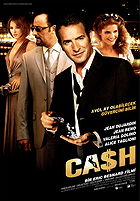 Posted : 12 years, 4 months ago on 6 February 2013 01:52
(A review of Ca$h)
Posted : 12 years, 4 months ago on 6 February 2013 01:52
(A review of Ca$h)What do you get when you put two of France's most charismatic stars in a glossy comedy about conmen? Not much in the case of Eric Besnard's Ca$h, which stars Jean Dujardin as a smooth operator and Jean Reno as his rich potential father-in-law, who may also be his latest pigeon. Throw in a murdered brother, a jewel heist, some mercenaries and Valeria Golino's cop who is either out to arrest them all to get a promotion or may be planning a bit of larceny herself if she can outwit the Internal Affairs men shadowing her and you've got a fairly predictable who's playing who caper with no new wrinkles to make it stand out. There's a feeling of ticking boxes, with none of the surprises or panache needed - this con is all front, going through the motions but never really convincing you. Dujardin's fine as the lead but Reno's not even pretending to bring his A-game to this one, Golino, saddled with an unconvincing tan and a hairstyle that makes her look like a barmaid in EastEnders with a slightly higher dress allowance, doesn't strike any sparks while Francois Berleand is wasted in a small sidekick role and Ciaran Hinds seems to be playing his senior detective like a disinterested bloodhound who gets irritable when you try to move it from it's snug place by the fire. It's perfectly watchable, but the neat payoff isn't really enough of a reward, making this one for the die-hard fans of the stars.
Boasting the kind of blatantly misleading packaging that is their stock in trade (in this case selling it as an action-packed thriller), Metrodome's UK Blu-ray is a sloppy affair that they clearly just rushed out to capitalise on Dujardin's success with The Artist: a decent but far from outstanding 2.35:1 widescreen transfer with occasionally hard to read subtitles, no menu options beyond `Play' (though the film is chaptered) and only a few unrelated trailers as extras.
Boasting the kind of blatantly misleading packaging that is their stock in trade (in this case selling it as an action-packed thriller), Metrodome's UK Blu-ray is a sloppy affair that they clearly just rushed out to capitalise on Dujardin's success with The Artist: a decent but far from outstanding 2.35:1 widescreen transfer with occasionally hard to read subtitles, no menu options beyond `Play' (though the film is chaptered) and only a few unrelated trailers as extras.
 0 comments, Reply to this entry
0 comments, Reply to this entry
Move on - nothing to see here
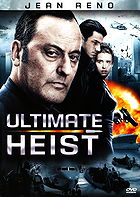 Posted : 12 years, 4 months ago on 6 February 2013 01:51
(A review of Ultimate Heist)
Posted : 12 years, 4 months ago on 6 February 2013 01:51
(A review of Ultimate Heist)When a film has as many alternate titles as Le Premier Cercle - aka Ultimate Heist, Inside Ring and The Dead List - it's never a good sign, and while it's not an outright turkey it's certainly a plodding and clichéd by the numbers crime flick that never catches fire. Jean Reno almost sleepwalks through his role as the head of a clan of immigrant Armenian armed robbers in the kind of professional but uninspired performance you get from someone who has done this sort of thing too many times before to get excited by it. Like Jean Gabin in his later years, he seems to be lending his presence without putting himself out too much, which is understandable with such a workmanlike script. The film's main focus is on his son Gaspard Ulliel, who wants to go legit and open a hotel in the Carmague with beautiful physiotherapist Vahina Giocante only for the family business and Sami Bouajila's smouldering cop to get in the way. Will Ulliel join his father for one last big heist? Will Reno kill the boy's pregnant girlfriend to bring him back in the fold? Will the audience be able to stay awake? Bouajila's the only one who seems to invest much presence in the film, but he's underused in a stock role while, despite making a minor impression with interesting French ghost story Children's Play ( Un jeu d'enfants ) ( A Children's Game ) [ English subtitles ] [DVD] eight years earlier, Laurent Tuel's direction is low key to the point of inertia at times and is given no help by Alain Kremski's dreary minimalist piano score which sounds like the kind of thing you hear on a public domain copy of a silent movie, and not in a good way. Move on, nothing to see here...
The NTSC DVD has an acceptable subtitled widescreen transfer with no extras apart from a few unrelated trailers.
The NTSC DVD has an acceptable subtitled widescreen transfer with no extras apart from a few unrelated trailers.
 0 comments, Reply to this entry
0 comments, Reply to this entry
"A sleeping thug is still a thug."
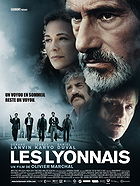 Posted : 12 years, 4 months ago on 6 February 2013 01:35
(A review of A Gang Story)
Posted : 12 years, 4 months ago on 6 February 2013 01:35
(A review of A Gang Story)After making his reputation with tales of dysfunctional cops like 36 Quai des Orfevres, MR 73 and the TV series Braquo, French cop-turned-director Olivier Marchal takes a look at the other side with Les Lyonnais aka Gang Story, which sees Gerard Lanvin's successful ageing crook torn between flashbacks of his youth and springing childhood friend Tcheky Karyo from jail. Naturally things go horribly wrong, blood is spilled, the innocent suffer and long buried secrets and betrayals are uncovered.
Based loosely on the real Gang des Lyonnais and the memoirs of its leader Edmond Vidal, it's not as bleak or as emotionally gruelling as his much more ambitious MR 73 [DVD]. There's a somewhat melancholy print the legend aspect to it and the structure and certain plot aspects probably owe more of a debt to Sergio Leone's Once upon a Time in America than to the truth - something emphasised by the very much alive appearance in the making of documentary of one real-life gang member who is killed in the film. It's a less iconic or ambiguous film and it gets off to a somewhat awkward start as it moves between the protagonists' past (where Lanvin and Karyo's characters are ably played by Dimitri Storoge and Olivier Chantreau) and present as the cops and drug runners alike step up the pressure. It's at its best in the energetic flashback scenes as we trace Lanvin's 70s rise from learning his craft with a gang of De Gaullist thugs who commit armed robbery to fund their fight against the left and promptly try to kill him, his wife and child when he asks for his cut to forming a hugely successful gang of his own. The more sedate, considered modern-day section takes rather longer to grab hold, with much silent introspection before the stakes are raised enough to gradually become compelling in their own right. The end result isn't a classic, but it's a satisfying polar that's worth a look despite the familiarity of the material.
The 52-minute documentary on Entertainment One's UK PAL DVD is more interesting than most, dealing with the relationship between the ex-robber and ex-cop turned filmmaker as much as the making of the film, though it's the only extra, though the English subtitled 2.35:1 widescreen transfer is fine.
Based loosely on the real Gang des Lyonnais and the memoirs of its leader Edmond Vidal, it's not as bleak or as emotionally gruelling as his much more ambitious MR 73 [DVD]. There's a somewhat melancholy print the legend aspect to it and the structure and certain plot aspects probably owe more of a debt to Sergio Leone's Once upon a Time in America than to the truth - something emphasised by the very much alive appearance in the making of documentary of one real-life gang member who is killed in the film. It's a less iconic or ambiguous film and it gets off to a somewhat awkward start as it moves between the protagonists' past (where Lanvin and Karyo's characters are ably played by Dimitri Storoge and Olivier Chantreau) and present as the cops and drug runners alike step up the pressure. It's at its best in the energetic flashback scenes as we trace Lanvin's 70s rise from learning his craft with a gang of De Gaullist thugs who commit armed robbery to fund their fight against the left and promptly try to kill him, his wife and child when he asks for his cut to forming a hugely successful gang of his own. The more sedate, considered modern-day section takes rather longer to grab hold, with much silent introspection before the stakes are raised enough to gradually become compelling in their own right. The end result isn't a classic, but it's a satisfying polar that's worth a look despite the familiarity of the material.
The 52-minute documentary on Entertainment One's UK PAL DVD is more interesting than most, dealing with the relationship between the ex-robber and ex-cop turned filmmaker as much as the making of the film, though it's the only extra, though the English subtitled 2.35:1 widescreen transfer is fine.
 0 comments, Reply to this entry
0 comments, Reply to this entry
A compelling policier with all the glamour removed
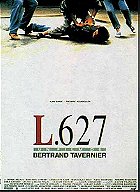 Posted : 12 years, 4 months ago on 6 February 2013 01:31
(A review of L.627)
Posted : 12 years, 4 months ago on 6 February 2013 01:31
(A review of L.627)Bertrand Tavernier's superb L.627 bears scant resemblance to the description its UK DVD distributors put out - `This gritty police drama shows us the underbelly of the Parisian drug trade. Lulu is a tough streetwise narcotics cop who, like a Frank Serpico or a Dirty Harry Callahan, doesn't play by the rules or kowtow to his weak and/or corrupt superiors. Lulu thrives in this violent world, where sheer guts can overcome his squad's deficiencies of money and equipment.' In reality, it's much more down to earth and compelling look at the day to day realities of fighting a never-ending war, spending more time on the mundane realities of police work and its limitations. These cops aren't Dirty Harry, they're underfunded and unappreciated and never bring down any big guys. When a long-time surveillance fails, it's because of the most petty reason imaginable. When there's finally some violence it's just over a petty offence rather than a major crime. They fill in forms in a crappy prefab office, wrestle with budget cuts, play practical jokes and make no difference whatever - all of which is surprisingly gripping.
At times some of the characters threaten to stray into cop movie clichés, such as Didier Bezace's relationship with a prostitute and casual informer, and there's a subplot with wedding videos that the film could do without, but other than that there's little to find fault with. Tavernier's direction is at once convincingly observational while remaining unobtrusively cinematic and he's assembled an equally convincing ensemble cast, including Philippe Torreton, who would go on to play leading roles in Tavernier's Capitaine Conan and It All Starts Today. It's not a short movie - it's not far off the two-and-a-half hour mark - and as befits its subject matter it never reaches a grand climax but leaves its characters no better than when we found them, but you won't feel you've wasted the time you spend with them.
The French DVD boasted an impressive array of extras - audio commentary by Bertrand Tavernier, Michel Alexandre and Charlotte Kady, 3 deleted scenes, behind the scenes footage, stills gallery and theatrical trailer - but while the feature had English subtitles, none of the extras did. Optimum's UK DVD offers a different but very decent selection of its own: a different English-language commentary and lengthy on-camera interview with Tavernier and the trailer, and offers a very respectable subtitled widescreen transfer of the film itself.
At times some of the characters threaten to stray into cop movie clichés, such as Didier Bezace's relationship with a prostitute and casual informer, and there's a subplot with wedding videos that the film could do without, but other than that there's little to find fault with. Tavernier's direction is at once convincingly observational while remaining unobtrusively cinematic and he's assembled an equally convincing ensemble cast, including Philippe Torreton, who would go on to play leading roles in Tavernier's Capitaine Conan and It All Starts Today. It's not a short movie - it's not far off the two-and-a-half hour mark - and as befits its subject matter it never reaches a grand climax but leaves its characters no better than when we found them, but you won't feel you've wasted the time you spend with them.
The French DVD boasted an impressive array of extras - audio commentary by Bertrand Tavernier, Michel Alexandre and Charlotte Kady, 3 deleted scenes, behind the scenes footage, stills gallery and theatrical trailer - but while the feature had English subtitles, none of the extras did. Optimum's UK DVD offers a different but very decent selection of its own: a different English-language commentary and lengthy on-camera interview with Tavernier and the trailer, and offers a very respectable subtitled widescreen transfer of the film itself.
 0 comments, Reply to this entry
0 comments, Reply to this entry
Petit Lieutenant [Region 1] [US Import] [NTSC] review
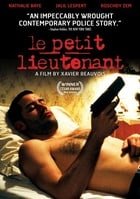 Posted : 12 years, 4 months ago on 6 February 2013 01:24
(A review of Petit Lieutenant [Region 1] [US Import] [NTSC])
Posted : 12 years, 4 months ago on 6 February 2013 01:24
(A review of Petit Lieutenant [Region 1] [US Import] [NTSC])An engrossing movie that never makes the leap to being a great one
Trailing a slew of awards and superlatives, French flic flick Le Petit Lieutenant is a film of two halves, the first half following a recently gradated young plain clothes cop through the traditional rites of passage - dealing with drunks, his first autopsy, trying to persuade his wife to give up her job and move to Paris with him, getting drunk with the boys, making that stupid mistake that threatens careers - the second half following Nathalie Baye's returning detective as the pressure makes her relapse back into drinking, the two linked by the pursuit of a pair of Russian muggers with a penchant for leaving their dead or dying victims in the canal. The case is followed in unsensational police procedural fashion, the few acts of violence and the one chase sequence underplayed effectively. These cops follow the rules, act and talk like real cops rather than movie cops and the mistakes they make are believable ones rather than movie ones. No-one takes the law into their own hands or goes rogue and the film unfolds in a naturalistic, genuine documentary approach, which means no excessive shakeycam or unnaturally processed orange and teal color palette.
What definitely doesn't feel real but seems common in a certain sort of policier is the absurd preponderance of movie posters dotted around the walls - Once Upon a Time in America, Saving Private Ryan, Podium, Taxi Driver, Un Flic, Seven, Reservoir Dogs, When We Were Kings and even a still from the Sicilian Clan make it look more a film distribution company's offices than a police station at times. Whether it's because of that unfortunate tendency to remind you of movies rather than the real life it strives for elsewhere or perhaps because at others it's almost a little too observational rather than drawing you in, it never quite packs the emotional punch you feel it aspires to when the inevitable error of judgement has disastrous consequences, though that's no fault of the excellent performances from Baye, revealing much by seeming to do little, a likeable Jalil Lespert and Roschdy Zem. Only the extended final shot is problematic, shifting from the character's confusion and discomfort to a couple of moments when it appears that they're consciously looking at the camera rather than, as presumably intended, the audience. As a result it's a good, engrossing movie that never makes the leap to a great one because it never quite makes up its mind whether it wants the audience to be unaware that it's just a movie or directly reminded of the fact.
The transfer is acceptable but not outstanding with the only extras a trailer and a photo gallery.
Trailing a slew of awards and superlatives, French flic flick Le Petit Lieutenant is a film of two halves, the first half following a recently gradated young plain clothes cop through the traditional rites of passage - dealing with drunks, his first autopsy, trying to persuade his wife to give up her job and move to Paris with him, getting drunk with the boys, making that stupid mistake that threatens careers - the second half following Nathalie Baye's returning detective as the pressure makes her relapse back into drinking, the two linked by the pursuit of a pair of Russian muggers with a penchant for leaving their dead or dying victims in the canal. The case is followed in unsensational police procedural fashion, the few acts of violence and the one chase sequence underplayed effectively. These cops follow the rules, act and talk like real cops rather than movie cops and the mistakes they make are believable ones rather than movie ones. No-one takes the law into their own hands or goes rogue and the film unfolds in a naturalistic, genuine documentary approach, which means no excessive shakeycam or unnaturally processed orange and teal color palette.
What definitely doesn't feel real but seems common in a certain sort of policier is the absurd preponderance of movie posters dotted around the walls - Once Upon a Time in America, Saving Private Ryan, Podium, Taxi Driver, Un Flic, Seven, Reservoir Dogs, When We Were Kings and even a still from the Sicilian Clan make it look more a film distribution company's offices than a police station at times. Whether it's because of that unfortunate tendency to remind you of movies rather than the real life it strives for elsewhere or perhaps because at others it's almost a little too observational rather than drawing you in, it never quite packs the emotional punch you feel it aspires to when the inevitable error of judgement has disastrous consequences, though that's no fault of the excellent performances from Baye, revealing much by seeming to do little, a likeable Jalil Lespert and Roschdy Zem. Only the extended final shot is problematic, shifting from the character's confusion and discomfort to a couple of moments when it appears that they're consciously looking at the camera rather than, as presumably intended, the audience. As a result it's a good, engrossing movie that never makes the leap to a great one because it never quite makes up its mind whether it wants the audience to be unaware that it's just a movie or directly reminded of the fact.
The transfer is acceptable but not outstanding with the only extras a trailer and a photo gallery.
 0 comments, Reply to this entry
0 comments, Reply to this entry
Requiem for a fool
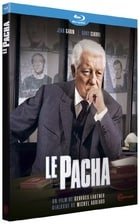 Posted : 12 years, 4 months ago on 6 February 2013 01:21
(A review of Pasha ( Le pacha ) ( La fredda alba del commissario Joss ) (Blu-Ray))
Posted : 12 years, 4 months ago on 6 February 2013 01:21
(A review of Pasha ( Le pacha ) ( La fredda alba del commissario Joss ) (Blu-Ray))Behind the apparently meaningless title of Georges Lautner's Le Pacha (it roughly translates as the guv'nor) is a very decent 1968 thriller that marks the beginning of the end of the old school policier. Jean Gabin's the old school cop nearing retirement - they've already written the speeches and ordered his cake - who's investigating an armoured car robbery and tracking down the gang member who has killed all his partners and everyone else on the inside on the job, including Gabin's childhood friend on the force. Less than enthused by the possibility of the killer getting off on a technicality or pleading insanity and on the assumption that the worst his superiors can do to him this late in his career is take away his cake, he decides to set him up for a more permanent sentence at the hands of a rival gang...
Running a lean 85 minutes, it's a well crafted number that hits all the expected notes quite satisfactorily without ever running the risk of being a classic, with Gabin a little bit more animated than usual for this late stage in his career - at times perhaps a little too animated when he overdoes the bulging eyes. He's the kind of cop who's running out of people to share childhood memories with and almost bemused by modern fads, particularly when interviewing suspects in an outrageous hippie nightclub (the film's trailer includes a great unused take of a dancer mussing up his hair that makes the take used in the film of him steering a wide berth of the gyrating loon even funnier). Like its star, the film is also stuck in mid-winter, using its snowy Christmas locales much more effectively in its setpieces than some of the interiors (the police station in particular looks like a 60s TV studio).
At the times the transitional nature of the film from old to new French cinema is a bit clumsy, not least the terrible backprojection in a few of the car scenes with Gabin, but they're more niggles than real problems. Lautner's handling of the opening robbery is excellent, as is Andre Pousse's stone-cold elimination of the hired help, stopping only briefly after one murder to check his horse racing bets on the TV and throwing in a neat spin on the getting-rid-of-the-car scene from Psycho with Brigitte Bardot singing Harley Davidson on the car radio. There's also an effective score by Serge Gainsbourg, who also makes a brief appearance (one of his backing musicians is also a small time crook and informant): at times it's the kind of gradual monotonous escalation that would probably be infuriating on a record but compliments the film surprisingly well. Gaumont's region-free French Blu-ray offers excellent picture quality with optional English subtitles and a generous helping of extras - documentary with many of the key players and extensive archive interviews with Gabin, interview with Gabin biographer André Brunelin, audio commentary by Lautner and Olivier Marchal and trailer - though sadly none of these are subtitled in English.
Running a lean 85 minutes, it's a well crafted number that hits all the expected notes quite satisfactorily without ever running the risk of being a classic, with Gabin a little bit more animated than usual for this late stage in his career - at times perhaps a little too animated when he overdoes the bulging eyes. He's the kind of cop who's running out of people to share childhood memories with and almost bemused by modern fads, particularly when interviewing suspects in an outrageous hippie nightclub (the film's trailer includes a great unused take of a dancer mussing up his hair that makes the take used in the film of him steering a wide berth of the gyrating loon even funnier). Like its star, the film is also stuck in mid-winter, using its snowy Christmas locales much more effectively in its setpieces than some of the interiors (the police station in particular looks like a 60s TV studio).
At the times the transitional nature of the film from old to new French cinema is a bit clumsy, not least the terrible backprojection in a few of the car scenes with Gabin, but they're more niggles than real problems. Lautner's handling of the opening robbery is excellent, as is Andre Pousse's stone-cold elimination of the hired help, stopping only briefly after one murder to check his horse racing bets on the TV and throwing in a neat spin on the getting-rid-of-the-car scene from Psycho with Brigitte Bardot singing Harley Davidson on the car radio. There's also an effective score by Serge Gainsbourg, who also makes a brief appearance (one of his backing musicians is also a small time crook and informant): at times it's the kind of gradual monotonous escalation that would probably be infuriating on a record but compliments the film surprisingly well. Gaumont's region-free French Blu-ray offers excellent picture quality with optional English subtitles and a generous helping of extras - documentary with many of the key players and extensive archive interviews with Gabin, interview with Gabin biographer André Brunelin, audio commentary by Lautner and Olivier Marchal and trailer - though sadly none of these are subtitled in English.
 0 comments, Reply to this entry
0 comments, Reply to this entry
Gabin at his most likeable
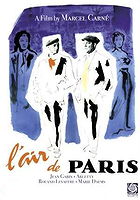 Posted : 12 years, 4 months ago on 6 February 2013 01:12
(A review of Air of Paris)
Posted : 12 years, 4 months ago on 6 February 2013 01:12
(A review of Air of Paris)1954's L'Air de Paris reunites Marcel Carné, Jean Gabin and Arletty 15 years and one World War after Le Jour se Leve and sees both stars older and, if not wiser, at least happier. He's a boxing coach who doesn't want to leave Paris because it's the only place he can breathe while she's the wife who's trying to persuade him to do just that because she's just inherited a nice cottage in Nice. But when he chances upon a youngster with a real shot at a future in the sport, a rift develops between them as she increasingly resents the newcomer. Since the boy isn't exactly big on self-confidence to begin with and falls in love with a model with her own problems (Marie Daems), Gabin's dreams of managing the kind of fighter he always wanted to be start looking increasingly tenuous.
Rather than the doomed romanticism of their previous collaboration, this is more of a crowd pleaser about ordinary people who've learned to live with their disappointments and know their hopes for a happy ending aren't very realistic. Already in the mentor phase of his career and yet to turn into the increasing monolithic presence of his later films, Gabin has probably never been so likeable on screen, and it's no surprise this was part of the one-two punch with his very different turn in Touchez Pas au Grisbi that won him the Best Actor award at the Venice Film Festival and helped put his fading post-war career back on track. Arletty gets the fuzzy end of the lollipop, yet manages to avoid turning her character into a stereotyped shrew but someone who's had a lifetime of indulging her husband's whims without question and wants him to return the compliment for once. Roland Lesaffre is the weakest link as the protégé: he gives it his all, as the trailer boasts `showing the full range of his talents,' but unfortunately that means alternating good scenes with ones where he either looks like a chipper Anton Diffring or a bit goofy when he's overdoing the (very) simple man in love bit. It's not so much that he's a bad actor (he even won an award for the film), more that his tendency to almost physically turn into a different person from scene to scene can be a bit distracting. Still, compared to Jean Paredes' very camp couturier, he's a model of restraint.
With only one prolonged bout in the middle of the film, it's more a character piece than a boxing movie. As such it tends to be damned with faint praise because it's not another classic to rival the central trio's earlier triumph, but while the absence of screenwriter Jacques Prevert means this is more populist than poetic it's still a perfectly decent star vehicle that fulfils most of its modest ambitions. There's also a beautiful score by Maurice Thiriet, though the vocal version of the main theme performed by Yves Montand that's promised on the credits is nowhere to be heard in the film itself (though part of it is used on the film's trailer, included on Optimum's UK DVD) and Roger Hubert's fine photography offers some atmospheric views of a Paris that's surprisingly multi-cultural for a 50's film. Optimum's DVD transfer has the odd rough patch but is for the most part very decent, though the original five minute French trailer is the only extra.
Rather than the doomed romanticism of their previous collaboration, this is more of a crowd pleaser about ordinary people who've learned to live with their disappointments and know their hopes for a happy ending aren't very realistic. Already in the mentor phase of his career and yet to turn into the increasing monolithic presence of his later films, Gabin has probably never been so likeable on screen, and it's no surprise this was part of the one-two punch with his very different turn in Touchez Pas au Grisbi that won him the Best Actor award at the Venice Film Festival and helped put his fading post-war career back on track. Arletty gets the fuzzy end of the lollipop, yet manages to avoid turning her character into a stereotyped shrew but someone who's had a lifetime of indulging her husband's whims without question and wants him to return the compliment for once. Roland Lesaffre is the weakest link as the protégé: he gives it his all, as the trailer boasts `showing the full range of his talents,' but unfortunately that means alternating good scenes with ones where he either looks like a chipper Anton Diffring or a bit goofy when he's overdoing the (very) simple man in love bit. It's not so much that he's a bad actor (he even won an award for the film), more that his tendency to almost physically turn into a different person from scene to scene can be a bit distracting. Still, compared to Jean Paredes' very camp couturier, he's a model of restraint.
With only one prolonged bout in the middle of the film, it's more a character piece than a boxing movie. As such it tends to be damned with faint praise because it's not another classic to rival the central trio's earlier triumph, but while the absence of screenwriter Jacques Prevert means this is more populist than poetic it's still a perfectly decent star vehicle that fulfils most of its modest ambitions. There's also a beautiful score by Maurice Thiriet, though the vocal version of the main theme performed by Yves Montand that's promised on the credits is nowhere to be heard in the film itself (though part of it is used on the film's trailer, included on Optimum's UK DVD) and Roger Hubert's fine photography offers some atmospheric views of a Paris that's surprisingly multi-cultural for a 50's film. Optimum's DVD transfer has the odd rough patch but is for the most part very decent, though the original five minute French trailer is the only extra.
 0 comments, Reply to this entry
0 comments, Reply to this entry
"Society needs its illusionists."
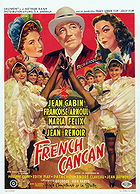 Posted : 12 years, 4 months ago on 6 February 2013 01:04
(A review of French Cancan (1955))
Posted : 12 years, 4 months ago on 6 February 2013 01:04
(A review of French Cancan (1955))Jean Renoir's first film in France since La Regle du Jeu had been met with almost unanimous hostility by critics and public alike 16 years earlier, French Cancan was a very deliberate attempt to reconnect with a French audience with a populist subject matter. As added security he cast Jean Gabin in the lead, though the results fall a long way short of their previous pre-war collaborations. Based loosely on the creation of the Moulin Rouge nightclub in Paris, offering `the illusion of the high life for modest purses,' and the romantic entanglements of financially insecure and terminally unfaithful impresario Jean Gabin and his latest discovery Francois Arnaul, who is pursued by a prince and a baker's boy but really wants Gabin, it's the sort of soufflé that should be a lot of fun. That it never really fulfils that promise isn't for want of trying: Renoir recreates la Belle Epoque with the kind of colours his father would have used and fills the supporting cast with colourful characters from all stratas of French society (a very young Michel Piccoli among them), and even casts veteran performers who graced the real Moulin Rouge like Edith Piaf, Patachou, Andre Claveau and Jean Raymond in cameos, but the script doesn't really do much with the material or the characters.
At times it's hard to escape the feeling that Renoir wasn't really the right director for the film - while not exactly heavy-handed, doesn't seem to have the lightness of touch this sort of thing needs. More surprisingly his use of the camera is surprisingly unadventurous and distinctly lacking in joie de vivre in the climactic musical number, much of which looks like it was shot from the cheap seats to make sure he gets everyone in the frame, proscenium arch style - not entirely out of place for a backstage story, but a rather disinterested approach you doubt the pre-war Renoir would have made.
There are hints of the old Renoir in its acceptance of the various characters faults - "No better, no worse, just different," as Giani Esposito's suicidal Prince admits - and in the casual merry-go-round of relationships and alliances and the importance of appearances (because "Appearances are all that can save us"), but this is neither deep enough nor superficially enjoyable enough to offer more than the odd passing pleasure as it inoffensively puts its characters through their paces in a somewhat workmanlike fashion. Not bad, just not nearly as good as its pedigree almost seems to demand it should be.
The BFI's Region B-locked Blu-ray/DVD combo benefits greatly from the recent restoration of the film, and is a noticeable improvement on the Criterion DVD. None of the extras from that earlier release - TV interview with Renoir, introduction by Peter Bogdanovich, new interview with production designer Max Doury and stills gallery - have been carried over, though there's a good selection of new ones carried over from the French Blu-ray release, but given the English subtitles that version lacked: a 57-minute documentary on the making of the film, a featurette on he restoration and a booklet (but not the additional 51 minute documentary on Renoir's legacy or the original trailer from the French release). As with the Criterion release, this is the uncut French version of the film rather than the heavily censored US release.
At times it's hard to escape the feeling that Renoir wasn't really the right director for the film - while not exactly heavy-handed, doesn't seem to have the lightness of touch this sort of thing needs. More surprisingly his use of the camera is surprisingly unadventurous and distinctly lacking in joie de vivre in the climactic musical number, much of which looks like it was shot from the cheap seats to make sure he gets everyone in the frame, proscenium arch style - not entirely out of place for a backstage story, but a rather disinterested approach you doubt the pre-war Renoir would have made.
There are hints of the old Renoir in its acceptance of the various characters faults - "No better, no worse, just different," as Giani Esposito's suicidal Prince admits - and in the casual merry-go-round of relationships and alliances and the importance of appearances (because "Appearances are all that can save us"), but this is neither deep enough nor superficially enjoyable enough to offer more than the odd passing pleasure as it inoffensively puts its characters through their paces in a somewhat workmanlike fashion. Not bad, just not nearly as good as its pedigree almost seems to demand it should be.
The BFI's Region B-locked Blu-ray/DVD combo benefits greatly from the recent restoration of the film, and is a noticeable improvement on the Criterion DVD. None of the extras from that earlier release - TV interview with Renoir, introduction by Peter Bogdanovich, new interview with production designer Max Doury and stills gallery - have been carried over, though there's a good selection of new ones carried over from the French Blu-ray release, but given the English subtitles that version lacked: a 57-minute documentary on the making of the film, a featurette on he restoration and a booklet (but not the additional 51 minute documentary on Renoir's legacy or the original trailer from the French release). As with the Criterion release, this is the uncut French version of the film rather than the heavily censored US release.
 0 comments, Reply to this entry
0 comments, Reply to this entry
 Login
Login
 Home
Home 100 Reviews
100 Reviews Collections
Collections